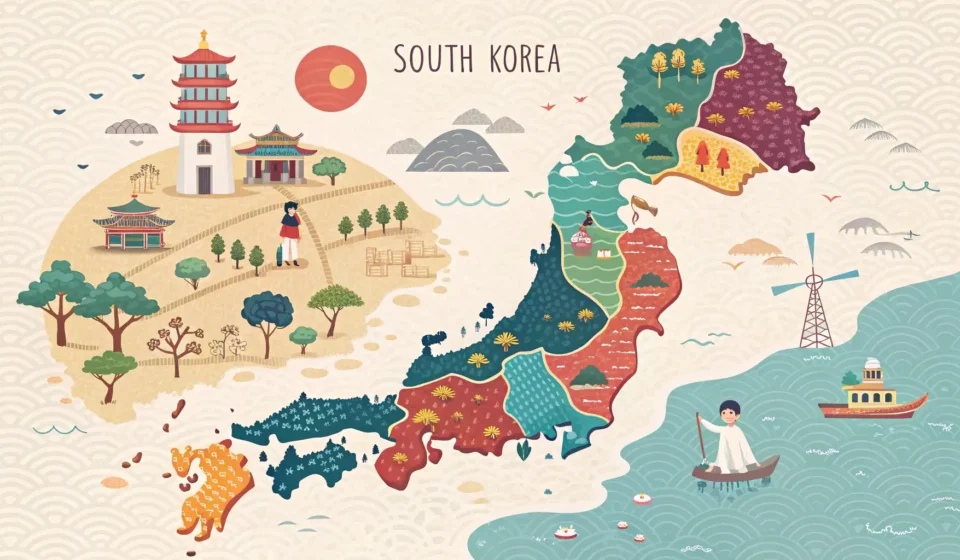
Learning the Names of Major Korean Cities and Provinces
Understanding the administrative divisions of South Korea, including its major cities (광역시) and provinces (도), is essential for travel, understanding regional contexts, and discussing geography. This guide provides the names, pronunciations, and classifications of these key locations, along with useful phrases and cultural insights to help you navigate conversations about different parts of Korea.
Table Of Content
Core Terms
-
Expression: 광역시
Pronunciation: gwang-yeok-si
Meaning: Metropolitan City (A major city with administrative status similar to a province) -
Expression: 도
Pronunciation: do
Meaning: Province (The largest administrative division in Korea) -
Expression: 특별시
Pronunciation: teuk-byeol-si
Meaning: Special City (Specifically refers to Seoul) -
Expression: 특별자치시
Pronunciation: teuk-byeol-ja-chi-si
Meaning: Special Self-Governing City (Specifically refers to Sejong) -
Expression: 특별자치도
Pronunciation: teuk-byeol-ja-chi-do
Meaning: Special Self-Governing Province (Specifically refers to Jeju)
Metropolitan Cities (Gwangyeoksi)
-
Expression: 부산광역시
Pronunciation: bu-san gwang-yeok-si
Meaning: Busan Metropolitan City -
Expression: 대구광역시
Pronunciation: dae-gu gwang-yeok-si
Meaning: Daegu Metropolitan City -
Expression: 인천광역시
Pronunciation: in-cheon gwang-yeok-si
Meaning: Incheon Metropolitan City -
Expression: 광주광역시
Pronunciation: gwang-ju gwang-yeok-si
Meaning: Gwangju Metropolitan City -
Expression: 대전광역시
Pronunciation: dae-jeon gwang-yeok-si
Meaning: Daejeon Metropolitan City -
Expression: 울산광역시
Pronunciation: ul-san gwang-yeok-si
Meaning: Ulsan Metropolitan City
Provinces (Do)
-
Expression: 경기도
Pronunciation: gyeong-gi-do
Meaning: Gyeonggi Province -
Expression: 강원도
Pronunciation: gang-won-do
Meaning: Gangwon Province -
Expression: 충청북도
Pronunciation: chung-cheong-buk-do
Meaning: North Chungcheong Province -
Expression: 충청남도
Pronunciation: chung-cheong-nam-do
Meaning: South Chungcheong Province -
Expression: 전라북도
Pronunciation: jeol-la-buk-do
Meaning: North Jeolla Province -
Expression: 전라남도
Pronunciation: jeol-la-nam-do
Meaning: South Jeolla Province -
Expression: 경상북도
Pronunciation: gyeong-sang-buk-do
Meaning: North Gyeongsang Province -
Expression: 경상남도
Pronunciation: gyeong-sang-nam-do
Meaning: South Gyeongsang Province
Special Administrative Regions
-
Expression: 서울특별시
Pronunciation: seo-ul teuk-byeol-si
Meaning: Seoul Special City -
Expression: 세종특별자치시
Pronunciation: se-jong teuk-byeol-ja-chi-si
Meaning: Sejong Special Self-Governing City -
Expression: 제주특별자치도
Pronunciation: je-ju teuk-byeol-ja-chi-do
Meaning: Jeju Special Self-Governing Province
Useful Phrases
-
Expression: 고향이 어디세요?
Pronunciation: go-hyang-i eo-di-se-yo?
Meaning: Where is your hometown? (Polite) -
Expression: 저는 부산 출신이에요.
Pronunciation: jeo-neun bu-san chul-sin-i-e-yo.
Meaning: I am from Busan. -
Expression: 서울에 살아요.
Pronunciation: seo-ul-e sal-a-yo.
Meaning: I live in Seoul. -
Expression: 제주도에 가봤어요?
Pronunciation: je-ju-do-e ga-bwat-seo-yo?
Meaning: Have you been to Jeju Island (Jeju Province)? -
Expression: 강원도는 경치가 아름다워요.
Pronunciation: gang-won-do-neun gyeong-chi-ga a-reum-da-wo-yo.
Meaning: Gangwon Province has beautiful scenery. -
Expression: 광주가 어디에 있어요?
Pronunciation: gwang-ju-ga eo-di-e it-seo-yo?
Meaning: Where is Gwangju located? -
Expression: 경기도는 서울 근처에 있어요.
Pronunciation: gyeong-gi-do-neun seo-ul geun-cheo-e it-seo-yo.
Meaning: Gyeonggi Province is near Seoul. -
Expression: 대전에 KTX 역이 있어요?
Pronunciation: dae-jeon-e KTX yeog-i it-seo-yo?
Meaning: Is there a KTX station in Daejeon? -
Expression: 경상북도에는 역사적인 장소가 많아요.
Pronunciation: gyeong-sang-buk-do-e-neun yeok-sa-jeog-in jang-so-ga man-a-yo.
Meaning: There are many historical places in North Gyeongsang Province. -
Expression: 인천공항은 인천광역시에 있어요.
Pronunciation: in-cheon-gong-hang-eun in-cheon-gwang-yeok-si-e it-seo-yo.
Meaning: Incheon Airport is in Incheon Metropolitan City.
Korean Culture Notes
Regional Identity: Koreans often have a strong sense of regional identity tied to their hometown (고향 – go-hyang). Knowing the major cities and provinces helps understand these connections.
Dialects (사투리 – sa-tu-ri): Different regions have distinct dialects. For example, the dialect in Busan (경상도 사투리 – gyeong-sang-do sa-tu-ri) sounds quite different from standard Seoul Korean.
Economic and Cultural Hubs: Seoul (서울) is the undisputed political, economic, and cultural capital. However, cities like Busan (port city, second largest), Daegu, Incheon (major airport), and Gwangju are significant regional centers.
Travel Destinations: Certain regions are famous for specific attractions. Jeju Island (제주도) is a top vacation spot, Gangwon Province (강원도) is known for mountains and beaches, and Gyeongju city in North Gyeongsang Province (경상북도) is rich in historical sites.
Administrative Changes: Sejong City (세종특별자치시) is a relatively new administrative capital designed to decentralize government functions from Seoul.
Real Conversation Example
Situation: Two colleagues, Minjun and Sora, are chatting during a coffee break.
Roles:
A: Minjun
B: Sora
-
Expression: A: 소라 씨, 고향이 어디세요?
Pronunciation: so-ra ssi, go-hyang-i eo-di-se-yo?
Meaning: Sora, where is your hometown? -
Expression: B: 저는 전라남도 광주 출신이에요. 민준 씨는요?
Pronunciation: jeo-neun jeol-la-nam-do gwang-ju chul-sin-i-e-yo. min-jun ssi-neun-yo?
Meaning: I’m from Gwangju in South Jeolla Province. How about you, Minjun? -
Expression: A: 아, 광주요! 저는 강원도 강릉에서 자랐어요.
Pronunciation: a, gwang-ju-yo! jeo-neun gang-won-do gang-neung-e-seo ja-rat-seo-yo.
Meaning: Oh, Gwangju! I grew up in Gangneung, Gangwon Province. -
Expression: B: 강릉이요? 바다가 정말 아름답다고 들었어요!
Pronunciation: gang-neung-i-yo? ba-da-ga jeong-mal a-reum-dap-da-go deul-eot-seo-yo!
Meaning: Gangneung? I heard the sea there is really beautiful! -
Expression: A: 네, 맞아요. 여름에 특히 좋아요. 광주도 좋은 곳이 많죠?
Pronunciation: ne, maj-a-yo. yeo-reum-e teu-ki jo-a-yo. gwang-ju-do jo-eun gos-i man-jo?
Meaning: Yes, that’s right. It’s especially nice in the summer. Gwangju has many good places too, right? -
Expression: B: 그럼요. 특히 음식이 맛있기로 유명해요! 나중에 한번 놀러오세요.
Pronunciation: geu-reom-yo. teu-ki eum-sig-i mat-it-gi-ro yu-myeong-hae-yo! na-jung-e han-beon nol-leo-o-se-yo.
Meaning: Of course. It’s particularly famous for delicious food! Come visit sometime later.
Practice Tips
Learning these names takes practice! Try associating each city or province with a famous landmark, food, or fact~ For example, think ‘Jeju – Island Paradise’ or ‘Busan – Beach & Seafood’!
Look at a map of Korea while reviewing the names. Visualizing the locations can really help solidify them in your memory. You can also practice asking and answering questions about hometowns with study partners or friends. Good luck! 화이팅!






